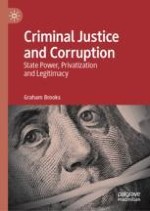2019 | OriginalPaper | Buchkapitel
5. The Jury and Potential for Corruption
verfasst von : Graham Brooks
Erschienen in: Criminal Justice and Corruption
Aktivieren Sie unsere intelligente Suche, um passende Fachinhalte oder Patente zu finden.
Wählen Sie Textabschnitte aus um mit Künstlicher Intelligenz passenden Patente zu finden. powered by
Markieren Sie Textabschnitte, um KI-gestützt weitere passende Inhalte zu finden. powered by
